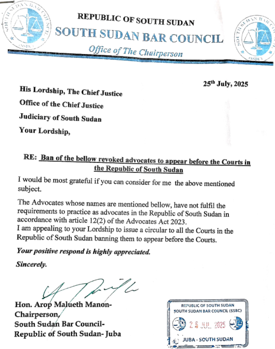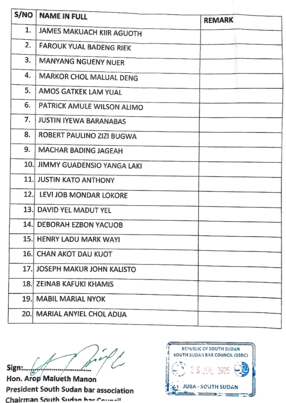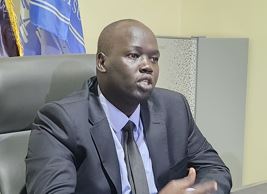The chairperson of the South Sudan Bar Council has said they have found that many advocates practicing law do not have the requisite legal education and that others have forged papers or certificates from unrecognized universities, which does not allow them to be licensed to practice law in the country.
Arop Malueth Manon, who doubles as the President of the South Sudan Bar Association, wrote to the Chief Justice in July to alert the Judiciary of South Sudan about a list of 20 individuals who have not met the requirements to practice as advocates.
During an exclusive interview with Radio Tamazuj on Tuesday, Malueth revealed that the Bar Council will now move to prosecute fake advocates and those without practicing licenses to protect the public.
“After the Bar [Association] election in May, one of our agendas was the vetting and verification of the advocates who are practicing in South Sudan. The reason we prioritized this process is because before our election, there was a situation where there were two Bar Associations and the licensing for practicing was done without a proper legal body, the Bar Council,” he explained. “The Bar Associations were not properly constituted because licensing of advocates to practice in South Sudan is done by the Bar Council, which is constituted by members from the Judiciary, Ministry of Justice, and four senior advocates, plus me as the chairperson. So, after my election, the Bar Council was properly constituted and we embarked on screening the files of all the advocates in South Sudan.”
He said that according to the Advocates Act 2013, to qualify to practice in the country, one must meet some conditions in accordance with Sections 12 and 13 of the Act.
“When we embarked on the process, we found out that there are some members who are practicing without academic qualifications, which is the certificate for a Bachelor’s of Laws. We also got some people with papers from unrecognized universities,” he revealed. “Also, before our election, there was a Supreme Court order that dissolved the two Bar Associations, and they were supposed to stop their operations, but one of the associations, which was led by the current governor of Western Equatoria State, James Al-Taib Berapai, continued licensing advocates in violation of the court order. When we came, we revoked the people who were licensed by him because they were licensed illegally.”

According to Malueth, the 20 individuals on the list of those who do not qualify for practicing licenses do not have academic qualifications or possess certificates from unrecognized institutions.

“Especially the first one on the list, James Makuach Kiir, who was imprisoned for forged documents, so I do not know how he was licensed again by Al-Taib, but we revoked him because we know he does not hold any law degree from any university. He is not a lawyer at all, and yet he even claims he is a PhD holder,” he said. “There are also several advocates on the list who were licensed because they hold law degrees from unrecognized universities, like one that the government said is not recognized. Then, some advocates were licensed by Al-Taib after the Supreme Court order, so we also revoked them.”
“For these people, we even gave them a chance to reapply so that they are vetted again, but many did not have academic qualifications in their files, and they remain revoked. That is why we wrote to the Chief Justice that they must not be allowed to appear in court because they have no practicing license,” he added.
Malueth said their mission to verify certificates is not complete because there is a large number of people who qualified from foreign universities, but their papers have not been authenticated.
“We gave them a chance to authenticate their papers. I have stopped them from renewing their licenses until they comply with the evaluation of their certificates. So, this is an ongoing process,” he stated. “We will prosecute those who insist on practicing without licenses. Currently, three individuals are facing prosecution, and we have published the names of those who are not licensed so that people can notify the Bar Association, so that we can investigate and prosecute them.”
He revealed that the majority of the affected people are in Juba, as 80 percent of South Sudanese lawyers practice in Juba because some of the states do not have formal courts.
“The judiciary is trying to deploy judges across the country, but some have not reported to their stations. We have a lot of community conflicts because there are no judges in many places,” Malueth said.
Asked if they had received complaints from the public about unscrupulous advocates, he said they had not, but that they encourage people to contact the Bar Association, which has a disciplinary committee to handle such matters.
“We also encourage those who need lawyers to contact us because we can give them legal aid,” Malueth concluded.




